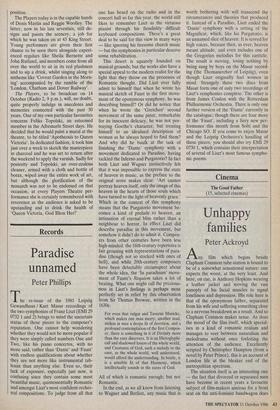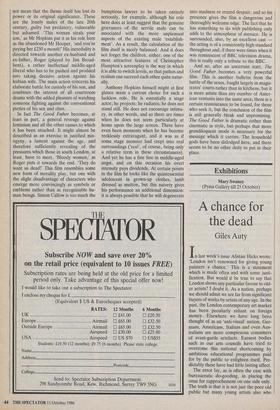Cinema
The Good Father (15, selected cinemas)
Unhappy families
Peter Ackroyd
Any film which begins beside Clapham Common tube station is bound to be of a somewhat sensational nature: one expects the worst, at the very least. And here, on cue, is Anthony Hopkins wearing a leather jacket and moving the vast panoply of his facial muscles to signal loneliness and depression. His role here is that of the eponymous father, separated from his wife and suffering something close to a nervous breakdown as a result. And so Clapham Common makes sense. As does the mood of the film itself, which special- ises in a kind of romantic realism and manages to veer between naturalism and melodrama without once forfeiting the attention of the audience. Excellently scripted by Christopher Hampton (from a novel by Peter Prince), this is an account of London life at the bleaker end of the metropolitan spectrum.
The situation itself is an interesting one — the fact that divorced or separated men have become in recent years a favourite subject of film-makers anxious for a front seat on the anti-feminist bandwagon does not mean that the theme itself has lost its power or its original significance. These are the lonely males of the late 20th century, guilty but predatory, vulnerable but ashamed. 'This woman steals your son,' as Mr Hopkins put it in his role here as the abandoned Mr Hooper, 'and you're paying her £250 a month!' His incredulity is directed towards another ex-husband and ex-father, Roger (played by Jim Broad- bent), a rather ineffectual middle-aged liberal who has to be pushed and prodded into taking decisive action against his lesbian wife. The main action concerns his elaborate battle for custody of his son, and combines the interest of all courtroom drama with the added pleasure of watching someone fighting against the conventional pieties of his sex and class.
In fact The Good Father becomes, at least in part, a general revenge against feminism and all the other causes to which it has been attached. It might almost be described as an exercise in justified mis- ogyny, a lament against the age, and therefore sufficiently revealing of the pressures which those in south London, at least, have to meet. 'Bloody women,' as Roger puts it towards the end. 'They do want us dead!' This film resembles some new form of morality play, but one with the slight disadvantage of characters who emerge more convincingly as symbols or emblems rather than as recognisable hu- man beings. Simon Callow is too much the bumptious lawyer to be taken entirely seriously, for example, although his role here does at least suggest that the genuine grievances of the servile male can be associated with •the more unpleasant aspects of the existing male 'establish- ment'. As a result, the calculation of the film itself is nicely balanced. And it does not forget the children, either: one of the most attractive features of Christopher Hampton's screenplay is the way in which it is able to switch levels, so that pathos and realism can succeed each other quite natur- ally.
Anthony Hopkins himself might at first glance seem a curious choice for such a luckless role. He is essentially a stage actor; he projects; he radiates; he does not stand still. He does not encourage intima- cy, in other words, and so there are times when he does not seem particularly at home upon the large screen. There have even been moments when he has become recklessly extravagant, and it was as if some stage monster had crept into real surroundings (`real', of course, being only a relative term in these circumstances). And yet he has a fine line in middle-aged angst, and on this occasion his overt intensity pays dividends. At certain points in the film he looks like the quintessential adolescent in grown-up clothes, lamb dressed as mutton, but this naivety gives his performance an additional dimension: it is always possible that he will degenerate into madness or crazed despair, and so his presence gives the film a dangerous and thoroughly welcome edge. The fact that he has something to do with publishing only adds to the atmosphere of menace. He is surrounded, also, by an excellent cast the acting is of a consistently high standard throughout and, if there were times when it was reminiscent of BBC television drama, this is really only a tribute to the BBC.
And so, after an uncertain start, The Good Father becomes a very powerful film. This is another bulletin from the battle of the sexes, fought largely in magis- trates' courts rather than in kitchens, but it is more astute than any number of Amer- ican ventures into the same area; there is a certain reasssurance to be found, for those who seek it, but the conclusion of the film is still generally bleak and unpromising. The Good Father is dramatic rather than cinematic in style, but perhaps that more grandiloquent mode is necessary for the message which it carries. The household gods have been dislodged here, and there seems to be no other deity to put in their place.



























































 Previous page
Previous page